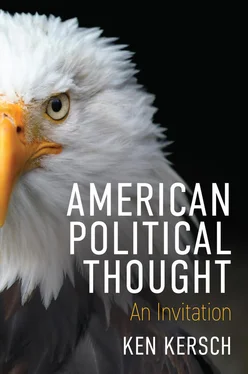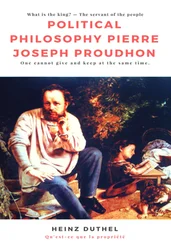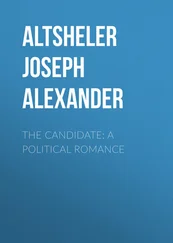Republican thought holds that corruption – the worst fate that can be befall a republic – can come from diverse sources: it can be brought on by a falling away from the state’s founding principles, and from a decline in virtuousness in the citizenry, including – in a refusal of the abstemious self-denial required of republicans – when citizens’ personal or private interests come to prevail over the commitment to virtuous life and the common good. This may be evidenced by a succumbing to the spirit of party, or to the spirit of commerce, the latter of which is doubly suspect as both being based in the pursuit of private interests and for its tendency to distract citizens from their strenuous responsibilities to actively participate in public life. Subversion is enabled by weakness and selfishness, treachery, disloyalty, and treason.
Unlike liberalism, which posits that the end of the state is the preservation of individual rights, republicanism posits a moral purpose or end for the state. As such, following Aristotle, republicanism places surpassing value on establishing the conditions for the cultivation of personal or civic virtue conducive to human flourishing. In this regard, republicans value laws directed to the improvement of men’s morals, at making men good. Consequently, as per the Swiss/French political thinker Jean-Jacques Rousseau, republican states will often hew to a “civil religion.” 4Many republicans understood theistic religions as instrumentally valuable in advancing the social and political order sustained by virtuous citizens in a free state – but only to the extent that they were consistent with, or lent support to, the society’s civic religion, which they privileged.
Despite their many differences, there are some commonalities among liberal and republican political outlooks. These include a commitment to limited government and the rule of law (albeit each according to its own distinctive concerns, aspirations, and idioms). Because it begins with mostly self-interested individuals, liberalism valorizes the establishment of institutional mechanisms of countervailing powers to enforce limitations on government power, to steer the exercise of the powers of government, to the extent possible, toward the best approximation of the public good. (Liberals vary in the degree to which they are sanguine about the possibility of doing so.) In its own more hopeful visions for the realization of the common good, republicanism, by contrast, places a higher value, and greater hopes, on inculcation through education and other formative practices (like patriotic exercises and military service), and on the strict adherence by a virtuous citizenry to rules and legal and institutional forms.
While it has its uses, the stark opposition often posited between the conceptual universes of liberal and republican thought – sometimes by contemporary scholars who joined one team or the other in the “Liberal–Republican” Debate – can distort the way that these different currents of thought have actually informed the American experience. Ancient, Renaissance, and modern republicanism, for one thing, were not identical. While their core preoccupations and commitments mark them as a continuation of the same family of ideas, modern republicans were more inclined to regard participation in the public sphere as an instrumental means to the achievement of private ends, as opposed to an independent means to human flourishing to be valued for its own sake. In this regard, while they valued direct civic engagement in public life more than liberals, their expectations and standards for that participation were much less strenuous than those of ancient Greece or Rome. They were certainly more amenable to commerce, and, although they lauded it when it appeared – in the courage and sacrifices of George Washington, for example, as a citizen and soldier – they lowered their expectation of the manifestation of heroic virtues by ordinary citizens in mundane times. Modern republicans certainly placed a much greater emphasis on individual liberty than did classical republicans. For these reasons, many of those moderns whose writings are considered core texts of American political thought, like Montesquieu, Thomas Jefferson, and Alexis de Tocqueville, are classed by some, sometimes, as republicans and by others, at other times, as liberals. The truth is that they drew from the well of both political thought traditions, which, moreover, cross-pollinated, and were far from static. The same was true for less well-known thinkers, and, indeed, of ordinary Americans as they have thought about and participated in public life over the course of American history.
Republican Foundations, Themes, and Political Preoccupations
1 Devotion to the common good
2 Pursuit of moral and civic virtue
3 Idea of a morally aspiring free state
4 Patriotism and sacrifice for the community
5 Valorization of public duties over private rights
6 Civic commitments/civic religion given priority over theistic private faith
7 Concern with decline, decay, or defeat through internal corruption or foreign subversion
8 Call for renewal through return to founding principles
Complications and Refinements: Other Liberalisms, Other Republicanisms, and Other Thought Traditions
It is hard to deny the remarkable ability of the Lockean liberal and republican frameworks to illuminate longstanding patterns in the way that Americans from the country’s inception have tended to think about, and practice, politics. In addition to arguing about the respective influence of one framework versus the other, generally, among different groups and actors, and across time, some scholars who broadly subscribe to the Hartz thesis positing Lockean liberal hegemony have suggested that it might be either more accurate or more helpful to look at American political thought through the prism of other American liberalisms that, in a positive sense, have served as foundations for American political thought, and/or, normatively, should serve as the basis for that thought.
In A Theory of Justice (1971), the Harvard analytic philosopher John Rawls (1921–2002), for instance, following liberal philosophers before him, including John Locke, but also David Hume, Immanuel Kant, and John Stuart Mill, explicated a new social contract considered and agreed upon, as he imagined it, by individuals in an “original position” under a “veil of ignorance” about how well they would fare in the new society, economically and in social status. The liberal Rawls posited that these hypothetically contracting individuals would place surpassing value on liberty and equality, via limited constitutional government by consent committed to the appropriate guarantees for individual rights. Rawls argued, broadly speaking, moreover, that in addition to securing these foundational guarantees, individuals operating behind a veil of ignorance would insist that the new political order be just, with what is just defined as what is fair (“justice as fairness”). This, Rawls argued, entailed not simply a commitment to maximizing individual liberty (so long as that liberty did not infringe upon the equal liberty of others – Mill’s “harm principle”). It further entailed a certain level of distributive justice – a floor, guaranteed by the liberal state, that set limits to the level of economic and social status inequality. Rawls enlisted the “minimax” principle (minimizing the maximum possible loss) in specifying how his theory of justice would ensure the realization of basic individual freedoms and equal opportunity of access to offices and positions. In this way, his liberalism sought to model a just political order that offered the fullest possible commitment to liberty and equality (equal rights to basic liberties), under conditions of universal access to power consistent with the full civic membership of free and equal citizens. This liberalism, unlike Locke’s, provided a clear justification for the modern redistributive (liberal) social welfare state.
Читать дальше












